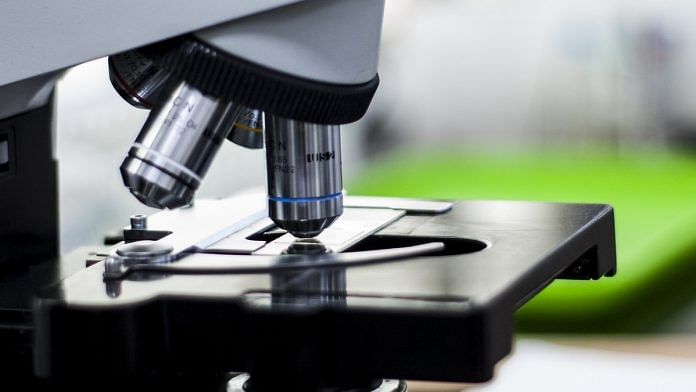New Delhi: A team of scientists in Bengaluru has claimed that it was able to stimulate skin cells to secrete naturally occurring antibiotics that can help treat ‘superbugs’ or drug-resistant bacteria.
Antibiotic drugs used to treat infections are increasingly becoming ineffective globally, with bacteria having developed resistance to them over time.
According to the latest study published last month in journal Cell Reports, scientists have discovered a way to stimulate skin cells to secrete antimicrobial peptides (AMPs).
AMPs target and kill bacteria in such variable ways that few bacteria ever become resistant to these molecules. This makes them uniquely suited to treating antibiotic-resistant bacteria, also called superbugs.
So far, artificially creating effective AMPs for use as antibiotic had not been possible.
The new discovery has the potential to treat and prevent infections for post-surgery wounds, especially in diabetic patients and those with weakened immune systems, the researchers said in a statement Thursday.
The team comprises scientists from the National Centre for Biological Sciences, an affiliate of the Tata Institute of Fundamental Research, the Institute for Stem Cell Science and Regenerative Medicine (inStem) and the R&D department of Unilever, all based in Bengaluru.
Also read: World’s most-isolated city catches NASA’s attention as it hunts for innovative tech
How the method came about
To develop new strategies to deal with antimicrobial resistance, scientists from inStem and Unilever probed the cellular mechanisms that regulate the release of AMPs.
Apart from their role as natural antibiotics, AMPs are also known to be involved in wound healing.
Amitabha Majumdar, a researcher at Unilever, hypothesised that the same machinery used to release AMPs during wound-healing could be harnessed to control AMP release from skin cells for treating or preventing infections.
To test this, Majumdar worked with Colin Jamora, a researcher at inStem’s Centre for Inflammation and Tissue Homeostasis, whose group works extensively on the mechanisms of wound-healing in skin.
The team found a new signalling pathway for long-term release of AMPs from skin cells. Usually, AMPs are released to fight off bacterial infections when direct contact between skin epidermal cells and bacteria occurs. This process is triggered by a reduction in the levels of a protein called caspase-8.
The scientists found that using molecular techniques to reduce caspase-8 is enough to trigger the release of stored AMP from skin cells.
Their study showed that just by modulating caspase-8 levels in the skin, AMP release can be controlled to prevent a whole spectrum of infections.
This may be especially useful for diabetics and patients with weakened immune systems who are highly susceptible to bacterial, yeast, fungal, and viral infections in post-surgery wounds.
Over the last century, bacteria have evolved so much to protect themselves against antibiotics that the World Health Organisation (WHO) fears humankind may soon slip back into a situation similar to the pre-antibiotic era.
According to a WHO report, the death toll caused by antimicrobial resistance is estimated to rise to 10 million annually by 2050 — with India carrying one of the largest burdens of drug-resistant pathogens worldwide.
Also read: Gene editing might alter our DNA, but at the cost of our humanity



